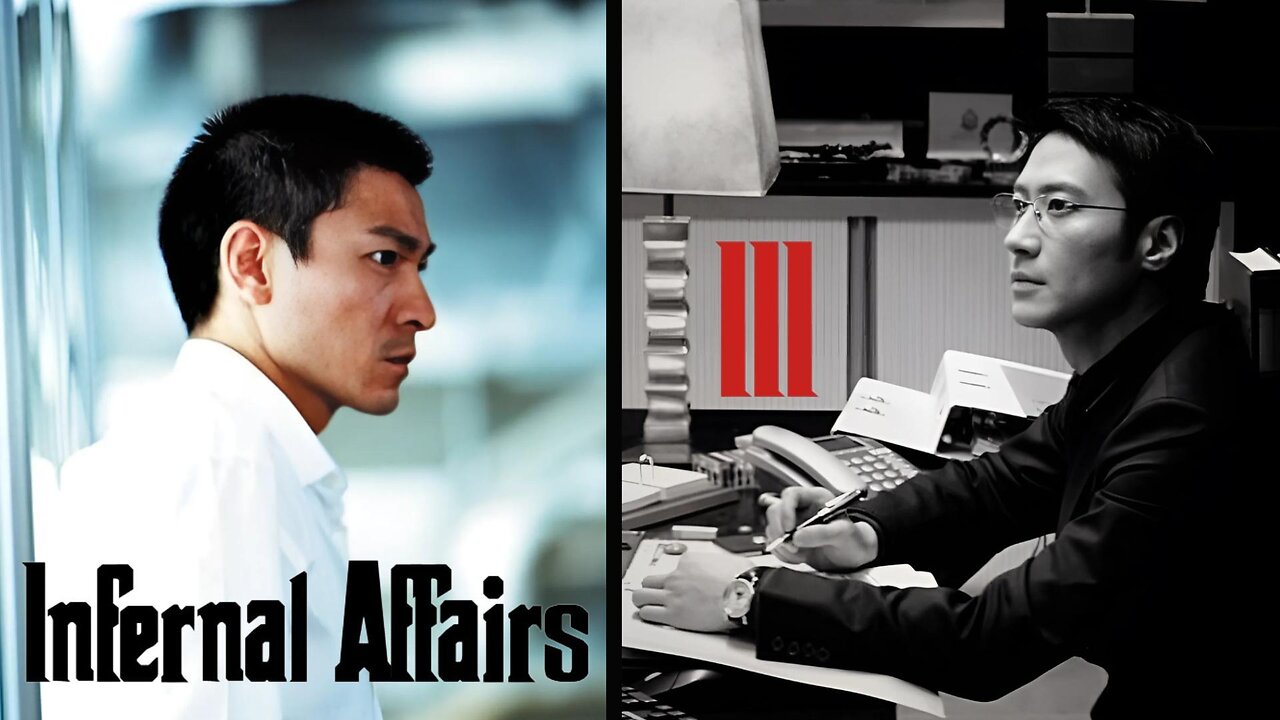Premium Only Content

Infernal Affairs III - Master piece or Failure?
Infernal Affairs III (2003) serves as both a sequel and a parallel narrative to the original Infernal Affairs (2002), weaving between two timelines—before and after the death of undercover cop Ngai Wing-Yan (Tony Leung). While its predecessors focused on dual identities and moral dilemmas, the third installment delves into psychological torment, guilt, and the inescapable grasp of fate, centering on the unraveling mind of Lao Kin-Ming (Andy Lau).
A Fractured Timeline, A Fractured Mind
The film’s nonlinear structure juxtaposes past and present, reinforcing the idea that both Lao and Ngai were always trapped in an unwinnable game. In 2002, Ngai, having uncovered his triad mole counterpart, Lao, continues his mission as an undercover cop while seeking redemption and a way back into the police force. He forms a fragile alliance with mainland businessman Shen Cheng (Chen Daoming), who harbors secrets of his own and hints at deeper corruption within the police and triads. Meanwhile, Lao’s paranoia grows as he tightens his grip on erasing evidence of his past crimes.
In 2003, following Ngai’s death, Lao is now a high-ranking officer but finds himself increasingly isolated. Despite achieving his lifelong goal of becoming a respected cop, his conscience eats away at him. Haunted by guilt and desperate to prove that he is a "good guy," he obsessively investigates Yung Kam Wing (Leon Lai), a newly promoted officer whom he suspects to be another mole. However, Lao’s deteriorating mental state leads him down a path of self-destruction, hallucinating Lao’s presence and seeing his own reflection as the enemy he once tried to eliminate.
A Psychological Inferno
Unlike the first two films, Infernal Affairs III shifts from a tense thriller to an introspective psychological drama. Lao’s descent into madness is the heart of the film, depicted through fragmented storytelling, distorted reality, and his fixation on rewriting history. He attempts to suppress his sins but ultimately falls victim to his own actions. His final moments, where he mindlessly taps Morse code—the same way Ngai once did—symbolize his eternal punishment, a fate worse than death.
A Conclusion Without Salvation
The film challenges traditional notions of justice, redemption, and morality. While Yan sought a way out but never got the chance, Lao, who once controlled his own destiny, is reduced to a shell of a man, living in his personal hell. The trilogy’s haunting message is clear: those who manipulate fate are bound to suffer its cruelest irony. Infernal Affairs III may not have the adrenaline-pumping suspense of its predecessors, but its deep, meditative approach to the aftermath of deception cements its place as a fitting, tragic conclusion to one of Hong Kong cinema’s greatest trilogies.
-
 1:24:00
1:24:00
Man in America
17 hours agoMarket Crash, Tariffs, USD Collapse: Trump's Plan to END the Old World Order? w/ John Perez
83.3K77 -
 8:07
8:07
Colion Noir
13 hours agoShould You Carry Non-Lethal Weapons For Self Defense?
64K55 -
 14:53
14:53
Forrest Galante
8 hours agoAustralia's Top 5 Deadliest Animals
45.9K12 -
 3:18:47
3:18:47
DLDAfterDark
8 hours ago $5.40 earnedDLD Live! What's The "best" PDW?? Considerations For Trunk/Truck Gun & Gats in Bags & Backpacks
29.9K7 -
 15:25
15:25
Exploring With Nug
19 hours ago $22.53 earnedBag of Phones Found While Searching For Missing Man In River!
89.3K27 -
 3:58:27
3:58:27
fuzzypickles168
8 hours agoLate Nite Jam Session - Rock Band 4 | Was: EA Sports WRC | 1 John 2:1-17
27.8K -
![Nintendo Switch It UP Saturdays with The Fellas: LIVE - Episode #13 [Mario Kart 8 Deluxe]](https://1a-1791.com/video/fww1/97/s8/1/1/g/A/z/1gAzy.0kob-small-Nintendo-Switch-It-UP-Satur.jpg) 3:33:38
3:33:38
MoFio23!
18 hours agoNintendo Switch It UP Saturdays with The Fellas: LIVE - Episode #13 [Mario Kart 8 Deluxe]
58.8K2 -
 23:24
23:24
MYLUNCHBREAK CHANNEL PAGE
19 hours agoDams Destroyed Turkey
105K94 -
 7:24:43
7:24:43
SpartanTheDogg
11 hours agoPro Halo Player
60.8K1 -
 11:29
11:29
Tundra Tactical
11 hours ago $3.75 earnedGEN Z Brit 3D Prints a WORKING Gun Pt.3!
60.1K4